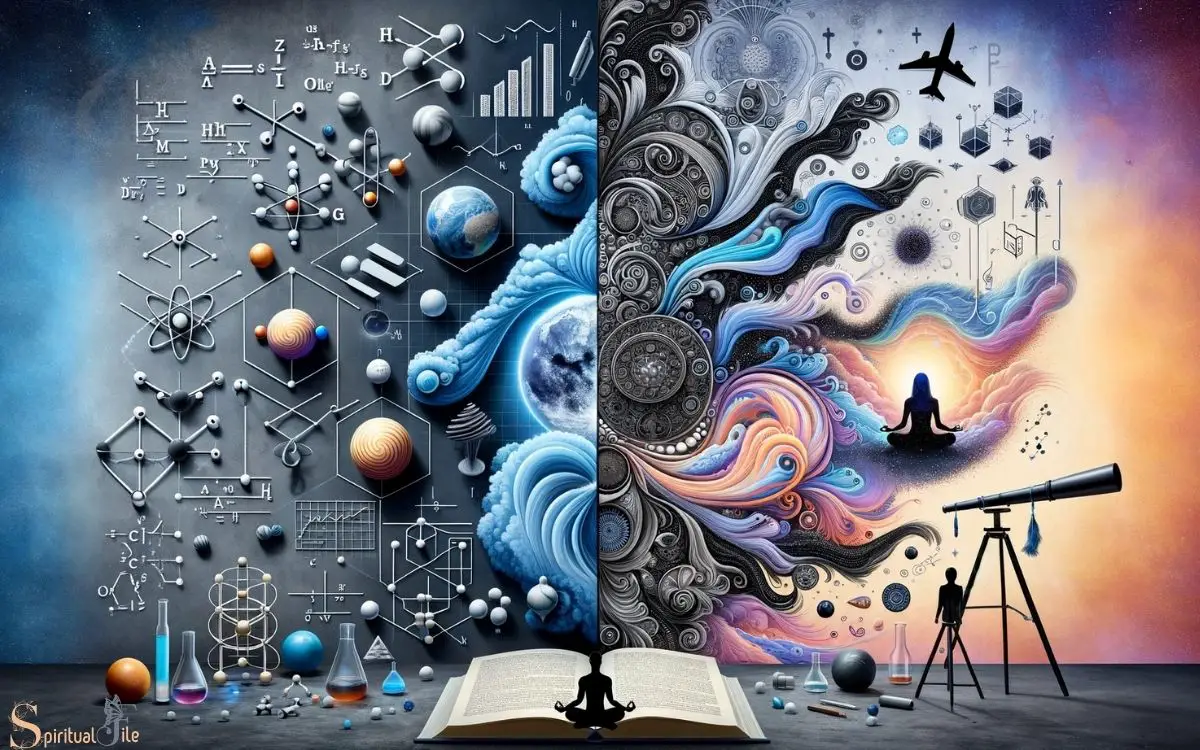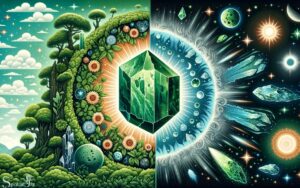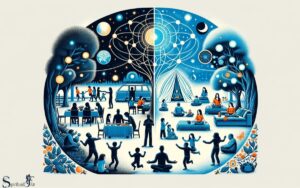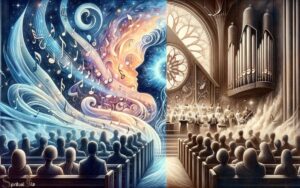Science Vs Spirituality Essay: Compatibility!
The essay delves into the relationship between science and spirituality, highlighting their compatibility and the belief among a significant portion of Americans that they can coexist.
It examines the origins, principles, and societal roles of both domains, seeking to illuminate how they intersect and differ, and discusses the potential for their integration and collaborative progress.
Science and spirituality have historically been viewed as distinct fields, with science focusing on empirical evidence and spirituality on personal belief and faith.
However, these domains share common ground:
For example, quantum physics introduces concepts that challenge our traditional understanding of the universe, which some interpret as opening a dialogue with spiritual perspectives.

Key Takeaway
4 Aspects: Science Vs Spirituality Essay
| Aspect | Science | Spirituality |
|---|---|---|
| Approach | Empirical, evidence-based | Subjective, belief-driven |
| Focus | Natural phenomena | Inner and transcendent |
| Methods | Observation, experimentation | Meditation, introspection |
| Goals | Explain, predict, control | Seek meaning, connection |
Origins of Science and Spirituality

Rarely in the history of human civilization have the pursuits of science and spirituality not intersected, each with its own origins rooted deep in the human experience.
Science, with its emphasis on empirical evidence and systematic study, traces its origins to ancient civilizations such as the Mesopotamians, Greeks, and Egyptians, who sought to understand the natural world through observation and experimentation.
On the other hand, spirituality, encompassing beliefs in higher powers, the afterlife, and the interconnectedness of all living beings, has its roots in the rituals, traditions, and philosophies of early human societies.
Both science and spirituality have evolved over time, shaping and being shaped by the cultural, social, and intellectual landscapes of human civilization, and continue to influence individuals and societies in profound ways.
Core Principles of Science

The core principles of science have evolved over time, guided by the relentless pursuit of empirical evidence and systematic inquiry into the natural world.
These principles form the foundation of scientific thought and practice, shaping the way we understand and interpret the world around us.
Three key principles of science include:
- Empiricism: The belief that knowledge is derived from sensory experience and observation, forming the basis of empirical evidence.
- Objectivity: The commitment to approaching inquiries and experiments without bias, allowing for impartial analysis and interpretation of results.
- Falsifiability: The notion that for a hypothesis or theory to be considered scientific, it must be testable and potentially disprovable through experimentation or observation.
These principles underpin the scientific method and are essential for the advancement of knowledge and understanding in the scientific community.
Core Principles of Spirituality

Spirituality encompasses the pursuit of transcendence, seeking a deeper understanding of existence and the interconnectedness of all things. It is rooted in core principles that guide individuals on their spiritual journey.
Here are four fundamental principles of spirituality:
| Principles | Description |
|---|---|
| Oneness | Acknowledgment of the interconnectedness of all living beings and the universe. |
| Inner peace | Cultivation of inner harmony and tranquility through mindfulness and self-reflection. |
| Compassion | Practice of empathy, kindness, and understanding towards oneself and others. |
| Purposefulness | Recognition of a higher purpose or meaning in life, guiding actions and decisions. |
These principles serve as pillars for individuals to connect with their inner selves, others, and the universe, fostering a sense of harmony and understanding.
Intersections and Divergences

One key determiner of the relationship between science and spirituality is the extent to which they intersect and diverge in their approaches to understanding the nature of reality and existence.
To shed light on this complex relationship, it is important to consider the following:
- Approaches to Knowledge: Science often relies on empirical evidence and the scientific method to understand the world, while spirituality may draw from personal experiences, intuition, and ancient wisdom traditions.
- Nature of Reality: Science tends to focus on the material and observable aspects of reality, whereas spirituality often explores the metaphysical, transcendent, and interconnected nature of existence.
- Integration of Perspectives: Despite their differences, there are instances where science and spirituality intersect, such as in the study of consciousness, the mind-body connection, and the exploration of the universe’s mysteries.
Understanding the intersections and divergences between science and spirituality can enrich our perspectives on the nature of reality.
Applications in Modern Society

The intersection of science and spirituality has significant implications for modern society.
In particular, the application of ethical decision-making frameworks derived from both fields can guide individuals and organizations in navigating complex moral dilemmas.
Additionally, the integration of spiritual practices and scientific insights has the potential to promote mental health and overall well-being in contemporary society.
Ethical Decision-Making Frameworks
Ethical decision-making frameworks play a crucial role in addressing complex moral dilemmas in modern society. When applied effectively, these frameworks provide a structured approach to navigating ethical challenges and making sound decisions.
Here are three key points to consider:
- Utilitarianism: This framework focuses on maximizing overall happiness and minimizing harm, often emphasizing the greatest good for the greatest number of people.
- Deontological Ethics: This approach prioritizes adherence to moral rules and principles, regardless of the outcomes, emphasizing the importance of duty and universal moral laws.
- Virtue Ethics: Centered on the development of virtuous character traits, this framework considers the moral character of individuals and the cultivation of ethical virtues in decision-making processes.
Mental Health and Well-Being
In the context of modern society, mental health and well-being are integral to the overall quality of life for individuals and communities.
With the increasing awareness of mental health issues, there is a growing emphasis on promoting well-being as a crucial aspect of public health.
In modern society, the application of scientific understanding to mental health has led to the development of evidence-based interventions, therapeutic techniques, and preventive measures.
Additionally, spirituality and mindfulness practices are being integrated into mental health care to enhance overall well-being.
The recognition of the interconnectedness of mind, body, and spirit has led to a more holistic approach to mental health, incorporating both scientific and spiritual perspectives.
This integration has the potential to provide individuals with a more comprehensive and personalized approach to mental health care, ultimately contributing to overall well-being.
Moving on to the subsequent section about ‘criticisms and defenses’, it is important to consider the various perspectives on the integration of science and spirituality in addressing mental health and well-being.
Criticisms and Defenses

The debate between science and spirituality has sparked criticisms and defenses on various fronts.
One key point of contention is the validity of evidence, with proponents of each side arguing for the reliability and relevance of their respective sources.
Additionally, ethical implications of beliefs and the intersection of knowledge have also come under scrutiny, shaping the ongoing discourse between these two paradigms.
Validity of Evidence
One must carefully assess the validity of evidence presented in the debate between science and spirituality in order to make informed judgments.
To navigate the complexities of evaluating evidence in the science vs. spirituality debate, consider the following:
- Empirical Evidence: Science often relies on empirical evidence, obtained through systematic observation and experimentation. However, spirituality may draw on personal experiences and subjective interpretations, which can be challenging to quantify.
- Interpretation and Bias: Both scientific and spiritual evidence can be subject to interpretation and bias. Understanding the potential for bias in the collection and interpretation of evidence is crucial in evaluating its validity.
- Integration of Perspectives: Recognizing the potential for complementary rather than conflicting evidence from science and spirituality can enrich the understanding of complex phenomena, encouraging a more holistic approach.
Ethical Implications of Beliefs
Navigating the ethical implications of beliefs in the science vs. spirituality debate requires a comprehensive understanding of the criticisms and defenses within the context of interpretation and bias.
Critics argue that spiritual beliefs may lead to dogmatic thinking, hindering scientific progress and rational decision-making. Additionally, they suggest that some spiritual beliefs may promote discrimination or justify harmful actions.
On the other hand, defenders argue that spirituality often promotes compassion, empathy, and a sense of interconnectedness, which can lead to ethical behavior and social harmony.
They also propose that science itself is not immune to ethical concerns, citing historical instances of unethical experimentation and environmental exploitation.
Ultimately, addressing the ethical implications of beliefs involves acknowledging the potential for both positive and negative outcomes, and striving for a balanced approach that respects diverse perspectives.
Intersection of Knowledge
In the debate between science and spirituality, the intersection of knowledge is a focal point for both criticisms and defenses.
- Scientific Criticisms: Science often criticizes spirituality for lacking empirical evidence and relying on unverifiable claims, which it views as a hindrance to the advancement of knowledge.
- Spiritual Defenses: Spirituality defends itself by emphasizing the limitations of scientific methods in addressing existential questions and the subjective nature of spiritual experiences that cannot be easily quantified or measured.
- Integration Efforts: Some scholars and practitioners seek to integrate scientific and spiritual knowledge, recognizing the potential for complementary insights and the need for a more holistic understanding of the universe.
This intersection prompts important discussions about the nature of knowledge, the boundaries of scientific inquiry, and the potential for interdisciplinary collaboration.
Future Integration and Collaboration

The future of integration and collaboration between science and spirituality holds great potential for furthering our understanding of the universe and human experience.
By bridging the gap between these two seemingly disparate realms, we can aspire to a more holistic comprehension of the world around us.
This integration can lead to a deeper exploration of consciousness, the nature of reality, and the interconnectedness of all things.
Collaborative efforts can also contribute to the development of new frameworks that encompass both scientific and spiritual insights, offering a more comprehensive approach to addressing existential questions.
As we move forward, it is essential to cultivate an open-minded and inclusive dialogue between these disciplines, recognizing that their convergence has the capacity to enrich our perspectives and enhance our collective pursuit of knowledge.
How Can Science and Spirituality Coexist in the Field of Nursing?
In the field of nursing, the debate of science versus spirituality in nursing is often a hot topic. While science focuses on evidence-based practice and medical interventions, spirituality emphasizes holistic care and compassion. Many nurses believe that a balance of both approaches is essential for providing comprehensive patient care.
FAQ of Science Vs Spirituality Essay
Can Science and Spirituality Coexist Peacefully, or Will There Always Be Conflict Between the Two?
The coexistence of science and spirituality is a complex issue. While both seek to understand the nature of existence, they often approach it from different perspectives.
Finding common ground requires open-mindedness and a willingness to bridge the gap between them.
Are There Any Specific Scientific Principles That Directly Contradict Spiritual Beliefs?
Certain scientific principles, such as evolution and the big bang theory, may directly contradict certain spiritual beliefs, particularly creationist or religious views on the origins of life and the universe.
This can create tension between the two perspectives.
How Do Modern Advancements in Technology and Medicine Intersect With Spiritual Beliefs and Practices?
Modern advancements in technology and medicine intersect with spiritual beliefs and practices by offering new tools for healing and understanding the human condition.
These developments can complement and enhance spiritual practices, providing a holistic approach to well-being.
What Are Some Common Criticisms of Attempts to Integrate Science and Spirituality, and How Can They Be Defended Against?
Common criticisms of integrating science and spirituality include concerns about conflicting belief systems and the subjective nature of spirituality.
These can be defended against by emphasizing the potential for complementary perspectives and the importance of open-minded dialogue.
What Does the Future Hold for the Collaboration and Integration of Science and Spirituality, and How Might This Impact Society as a Whole?
The future holds a promising collaboration of science and spirituality, potentially impacting society through deeper understanding, holistic approaches to well-being, and ethical advancements.
This partnership may foster a more comprehensive and harmonious worldview.
Conclusion
The integration and collaboration of science and spirituality offer a promising path for the future.
According to a survey conducted by the Pew Research Center, 59% of Americans believe that science and religion are often in conflict, while 38% believe they can coexist.
As society continues to navigate complex ethical and existential questions, a synthesis of these two domains has the potential to provide holistic solutions and a deeper understanding of the world around us.






